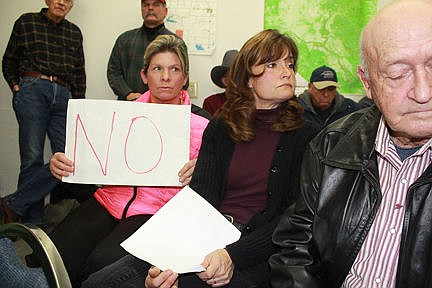Irrigators still not sold on water compact
Reacting to a water compact agreement between state officials and the Confederated Salish and Kootenai Tribes, Flathead Joint Board members brought forth resolutions for state legislators Tuesday.
But before they could decide which version to send to Helena, a majority voted to table the decision until a six-member committee can review the resolutions as deadlines loom for the legislature to approve the agreement.
“We need to tell our legislators what our positions are,” said FJBC member Jerry Laskody, of the Mission board. “There is a way to replace this and that’s through adjudication.”
But some board and audience members claimed at least half of the irrigators did not support either resolution, even if they do not support the Compact.
“We got the cart in the wrong place,” said Paul Kuenzler, FJBC member from the Flathead Irrigation District. “We need to put this to a vote.”
But Laskody, who has often said the Compact would lead to more litigation instead of unity and compromise, addressed the time crunch knowing that the state legislature would probably adopt the version of the Compact agreed upon Dec. 11 by the Confederated Salish and Kootenai Tribes and Gov. Steve Bullock and Attorney General Tim Fox.
Laskody bristled at the idea of waiting for a general vote.
“It’s too late for a referendum,” he said. “That could take 90 days and by that time it could be settled by the Legislature.”
Still, Kuenzler said many irrigators lost faith in the joint board and said at least half of them did not support any resolution.
Irrigator Susan Lake supports the Compact but not the resolution.
“Your job is to make sure we have enough water and this resolution doesn’t do that,” she told the members during public comment.
THE GOVERNOR
Fox and Bullock said the new compact will protect the tribes’ rights while ensuring irrigators, whose livelihoods depend on it, have a reliable water supply.
The agreement would provide a $30 million fund to pay for pumping water to meet irrigation demands, they claim, though Mission Valley irrigators do not believe it.
The compact also establishes a technical team that includes irrigators to protect historic uses of the reservation’s water while making sure the tribes’ streamflow targets are met on the Flathead River, according to Fox and Bullock. The compact needs approval from the Legislature, Congress and the Northwest Montana tribes.
PREVIOUS ATTEMPTS
The state Legislature rejected an agreement in 2013 after more than a decade of negotiations. At least four lawsuits are still pending over claims to the water flowing on or through the reservation.
The 2015 session is the final chance for lawmakers to approve a compact. If they do not, the tribes will have to assert their water rights in court by June 30, 2015. The Legislature has approved compacts for Montana’s six other reservations.



